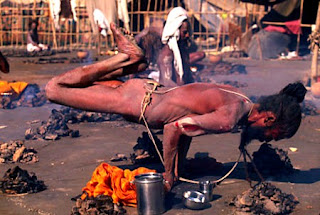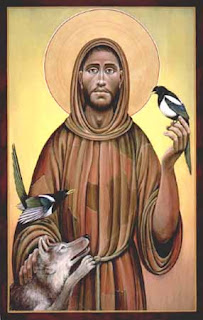Believe it or not, Lent was never observed by Christ or His apostles.He commanded them, “Go you therefore, and teach all nations…teaching them to observe all things whatsoever I have commanded you” (
Matt. 28:19-20).
Jesus never commanded them to observe Lent or Easter.He did, however, command them to keep Passover and the Days of Unleavened Bread.
In fact, during His last Passover on earth, Christ gave detailed instructions on how to observe the Passover service. He also instituted new Passover symbols (
John 13:1-17).
Notice what Alexander Hislop wrote in his book
The Two Babylons: “The festival, of which we read in Church history, under the name of Easter, in the third and fourth centuries, was quite a different festival from that now observed in the Romish Church, and at that time was not known by any such name as Easter…That festival [Passover] was not idolatrous, and it was preceded by no Lent. ‘It ought to be known,’ said Cassianus, the monk of Marseilles, writing in the fifth century, and contrasting the primitive [New Testament] Church with the Church of his day, ‘that the observance of the forty days had no existence, so long as the perfection of that primitive Church remained inviolate.’”
Lent was not observed by the first century Church!
It was first addressed by the church at Rome during the Council of Nicea in A.D. 325, when Emperor Constantine officially recognized that church as the Roman Empire’s state religion.
Any brand of Christianity that held to doctrines contrary to the Roman church was considered an enemy of the state.
In A.D. 360, the Council of Laodicea officially commanded Lent to be observed.Originally, people did not observe Lent for more than a week. Some kept it for one or two days. Others kept it for 40 consecutive hours, falsely believing that only 40 hours had elapsed between Christ’s death and resurrection.
Eventually, it became a 40-day period of fasting or abstaining from certain foods.
“The emphasis was not so much on the fasting as on the spiritual renewal that the preparation for Easter demanded. It was simply a period marked by fasting, but not necessarily one in which the faithful fasted every day. However, as time went on, more and more emphasis was laid upon fasting…During the early centuries (from the fifth century on especially) the observance of the fast was very strict. Only one meal a day, toward evening was allowed: flesh meat and fish, and in most places even eggs and dairy products, were absolutely forbidden. Meat was not even allowed on Sundays” (Catholic Encyclopedia).
From the ninth century onward, Lent’s strict rules were relaxed. Greater emphasis was given to performing “penitential works” than to fasting and abstinence.
According to the apostolic constitution Poenitemini of Pope Paul IV (Feb. 17, 1966), “abstinence is to be observed on Ash Wednesday and on all Fridays of the year that do not fall on holy days of obligation, and fasting as well as abstinence is to be observed on Ash Wednesday and Good Friday” (Catholic Encyclopedia).
Today, Lent is used for “fasting from sin and from vice…forsaking sin and sinful ways.”
It is a season “for penance, which means sorrow for sin and conversion to God.”
This tradition teaches that fasting and employing self-discipline during Lent will give a worshipper the “control over himself that he needs to purify his heart and renew his life.”
God did not design fasting as a tool for penance, “beating yourself up” or developing will power: “Is it such a fast that I have chosen? A day for a man to afflict his soul [fast]? Is it to bow down his head as a bulrush, and to spread sackcloth and ashes under him? Will you call this a fast, and an acceptable day to the Lord? Is not this the fast that I have chosen? To loose the bands of wickedness, to undo the heavy burdens, and to let the oppressed go free, and that you break every yoke? Is it not to deal your bread to the hungry, and that you bring the poor that are cast out to your house? When you see the naked, that you cover him; and that you hide not yourself from your own flesh?” (
Isa. 58:5-7).
God’s people humble themselves through fasting in order to draw closer to Him—to learn to think and act like Him—to live His way of life in all things.
Lent’s Ancient RootsComing from the Anglo-Saxon Lencten, meaning “spring,” Lent originated in the ancient Babylonian mystery religion.
“The forty days’ abstinence of Lent was directly borrowed from the worshippers of the Babylonian goddess…Among the Pagans this Lent seems to have been an indispensable preliminary to the great annual festival in commemoration of the death and resurrection of Tammuz” (The Two Babylons).
Tammuz was the Messiah of the Babylonians—a counterfeit of Jesus Christ!
The Feast of Tammuz was usually celebrated in June (also called the “month of Tammuz”).
Lent was held 40 days before the feast, “celebrated by alternate weeping and rejoicing.”
This is why Lent means “spring”; it took place from spring to early summer.
The Bible records ancient Judah worshipping Tammuz: “Then He brought me to the door of the gate of the Lord’s house which was toward the north; and, behold, there sat women weeping for Tammuz” (
Ezek. 8:14-15).
This was a great abomination in God’s eyes!
But why did the church at Rome institute such a pagan holiday?“To conciliate the Pagans to nominal Christianity, Rome, pursuing its usual policy, took measures to get the Christian and Pagan festivals amalgamated, and, by a complicated but skillful adjustment of the calendar, it was found no difficult matter, in general, to get Paganism and Christianity—now far sunk in idolatry—in this as in so many other things, to shake hands” (The Two Babylons).
The Roman church replaced Passover with Easter, moving the pagan Feast of Tammuz to early spring, “Christianizing” it.
Lent moved with it.
“This change of the calendar in regard to Easter was attended with momentous consequences.
It brought into the Church the grossest corruption and the rankest superstition in connection with the abstinence of Lent” (The Two Babylons).
Before giving up personal sins and vices during Lent, the pagans held a wild, “anything goes” celebration to make sure they got in their share of debaucheries and perversities—what the world celebrates as Mardi Gras today.






 Here you see a naked Sadhu performing a painful and difficult act of penance according to the Hindu tantric tradition.
Here you see a naked Sadhu performing a painful and difficult act of penance according to the Hindu tantric tradition.















